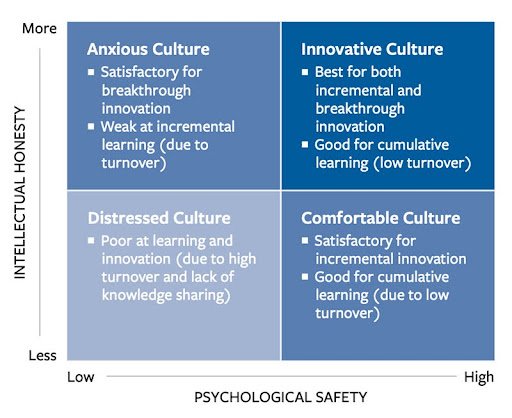Unlocking Innovation: The Power of Psychological Safety and Intellectual Honesty
I used to think that I hated conflict.
When I first took the StrengthsFinder test in college, I remember being disappointed to find out that my number one “strength,” according to Gallup, was harmony.
Harmony - People exceptionally talented in the Harmony theme look for consensus. They don’t enjoy conflict; rather, they seek areas of agreement.
Wow, thanks StrengthsFinder. So my number one strength, my greatest asset, is avoiding conflict??
I distinctly remember thinking that it sure sounds like harmony was a weakness being “dressed up” as a strength.
I eventually learned a critical distinction that helped me to appreciate harmony as a strength. Before I share that distinction, let’s talk about the importance of psychological safety to individual and organizational performance.
Psychological Safety and Performance
In her book The Fearless Organisation: Creating psychological safety in the workplace for learning, innovation and growth, author and professor Amy Edmonson defines Psychological Safety as an atmosphere where “people feel accepted and comfortable sharing concerns and mistakes without fear of embarrassment or retribution.”
It’s a climate “where people feel safe enough to take interpersonal risks by speaking up and sharing concerns, questions, or ideas.”
Edmonson is a professor of Leadership and Management at Harvard Business School and has spent two decades researching effective leadership in teaming, psychological safety, and organizational learning.
What she and many others have found is that psychological safety is key to performance and innovation – a workplace culture where team members feel comfortable openly sharing their thoughts and opinions, even if those thoughts and opinions go against the norm or challenge the status quo.
When team members feel psychologically safe, they are more likely to contribute, collaborate, take risks, and learn from their mistakes.
In a meta-analysis of multiple studies, Accenture found that organizational cultures with high psychological safety saw lower employee turnover, stress, higher engagement, more life satisfaction, and faster learning.
From Accenture: Why psychological safety at work matters to business. Sources: Gartner Research, The Missing Element in Nearly Every Learning Strategy; Gallup, State of the American Workforce Report; Zak, Paul J., “The Neuroscience of Trust,” Harvard Business Review, January 2017
Cultivating Psychological Safety in Your Leadership
Chris Ihrig, founder of Fired Up! Culture, recently published a piece called 7 Things Leaders Should Do to Build Psychological Safety for Their Team. It’s the best piece I’ve seen offering practical advice on cultivating psychological safety as a leader.
Ihrig, who serves as CEO – Chief Engagement Officer – shares practical tips for leaders to build psychological safety:
Lead by Example
Encourage Pushback
Celebrate Failure
Establish Clear Expectations
Give Constructive Feedback
Celebrate Success
Psychological Safety is Not About “Coddling”
The three that stand out to me are lead by example, encouraging pushback, and giving constructive feedback.
Leading by example starts with being open to feedback, owning mistakes, and being receptive to new ideas. As a leader, being transparent, vulnerable, and approachable is essential to set the tone for your entire team. As the leader goes, so goes the organization.
Actively encouraging pushback is essential to cultivating psychological safety goes one step further than being open to pushback. When a leader encourages pushback, team members feel safe to speak up, question decisions, and think beyond the status quo.
Constructive feedback is not negative or dismissive but rather clear, specific, and actionable. Constructive feedback also builds trust and respect between team members and leaders, especially when leaders are open to that same level of feedback themselves.
💡 Takeaway: If you want to encourage innovation, promote a culture of psychological safety. Lead by example, encourage pushback, celebrate failures and successes, set clear expectations, and give constructive feedback.
But psychological safety alone is not enough – there’s one more element to creating a culture of innovation. Let’s talk about intellectual honesty.
Why Innovation Requires Intellectual Honesty
Just as research indicates that psychological safety is important for people to question the status quo, fostering psychological safety isn’t enough if managers don’t pay particular attention to creating conditions for healthy debate.
If psychological safety is about creating conditions for people to speak the truth, then intellectual honesty is about taking the risk to actually speak that truth.
In the Why Innovation Depends on Intellectual Honesty (MIT Sloan Management Review), authors Jeff Dyer, Nathan Furr, Curtis Lefrandt, and Taeya Howell conducted research with over 60 companies on the interplay between psychological safety and intellectual honesty.
In the article, the authors argue that when teams prioritize psychological safety without realizing the social pressure to maintain togetherness, it can undermine intellectual honesty rather than encourage it.
But research also indicates that feeling that it’s safe to dissent isn’t the only important factor for ensuring healthy debate. In our studies of innovators and their teams, we’ve found there can be a tension that few people recognize between psychological safety and intellectual honesty: that is, a culture in which team members will proactively voice their ideas and disagreements in a rational and constructive way (like the Star Trek character Mr. Spock, but with acknowledgment of their human emotions and biases). Intellectual honesty significantly increases a team’s ability to innovate — particularly to create breakthrough innovations — because it unleashes the knowledge of team members.
Above: Pairing psychological safety (being able to speak up) with intellectual honesty (actually doing so) is like Mr. Spock, but with feeling!
The authors go on to describe four different cultures with corresponding levels of intellectual honesty:
Above: Four Innovation Cultures: How a team balances psychological safety and intellectual honesty will influence how well they can innovate and what they will be best at.
The ideal culture of innovation is high in both intellectual honesty and psychological safety. Consider the four cultures described above – what kind of culture do you have in your organization?
I’ve worked with many different organizations over the years, and I would say, especially in the nonprofit sector, organizations tend to err on the side of low intellectual honesty.
💡 Takeaway: To foster innovation, people must not only be free to speak up and share concerns, questions, or ideas – they must also take the risk by actually doing so. How can you encourage people to speak up, even when it might feel hard or risky?
Back to Harmony… The Good Kind
When I first learned that one of my strengths was harmony, I was disappointed. Then I learned one thing that changed everything.
I learned that harmony is not about avoiding all conflict – instead, harmony is about seeking agreement and avoiding relational conflict.
In other words, I learned to be comfortable with conflict about the best idea, strategy, or course of action. In the MIT Sloan article we talked about earlier, they describe this as task conflict:
Task conflict, disagreement about the work, can be highly productive for innovation and team performance.
Relational conflict, on the other hand, is unhelpful and unhealthy:
Relationship conflict, which arises when the way someone says or does something makes people feel rejected, is detrimental.
Because of this intense desire to be good with people interpersonally, I sometimes hold back from being fully intellectually honest. That’s why developing strong relationships is so important to me because trusting relationships increase the ability to have healthy task conflict.
Still, because I value relationships so highly, if I am going to err, I know I will tend to maintain relational harmony at the expense of intellectual honesty.
💡 Takeaway: Leaders naturally tend to gravitate one way or the other – toward intellectual honesty or psychological safety. Wise leaders understand where they are prone to err and balance that out with the other.
How about you? Do you tend to lean towards intellectual honesty or psychological safety? Do you hold back in the name of peace and camaraderie? Do you speak the truth but in ways that inhibit trust?
Something to think about as you seek to create a culture that fosters innovation and growth.
Until next week… Surfs Up! 🌊
- Dave
About the Author | Dave Raley
Consultant, speaker, and writer Dave Raley is the founder of Imago Consulting, a firm that helps non-profits and businesses create profitable growth through sustainable innovation. He’s the author of a weekly trendspotting report called The Wave Report, and the co-founder of the Purpose & Profit Podcast — a show about the ideas at the intersection of nonprofit causes and for-profit brands.
Want to receive insights like this weekly?
Every Friday, we send out The Wave Report, highlighting one trend or insight “wave,” from donor and consumer trends to innovation in different industries or new models for growth.
Subscribe today to receive free weekly insights in your inbox here:



